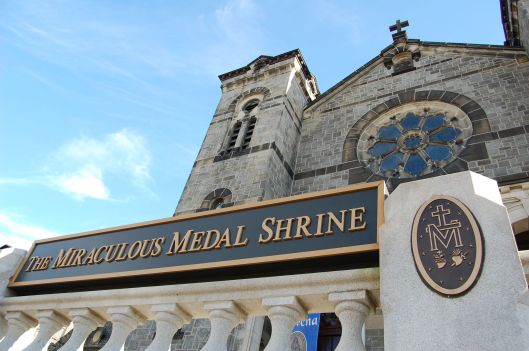With All Saints Day celebrated on November 1, it is true: saints are made not born. There apparently is no magic gene. Witness St. Augustine who lived a rebellious and hooligan lifestyle before becoming righteous. St. Ignatius was a gambler and ruled by the sword before reforming. These two saints overcame adverse lifestyles to become larger than life saints.
Blessed John Paul II said, “The saints have always been the source and origin of renewal in the most difficult moments in the Church’s history.” The saints are needed now as in other times of church turmoil.
The entrance antiphon for St. Basil’s feast day earlier this year, “Let the peoples recount the wisdom of the Saints, and let the Church proclaim their praise. Their names will live on and on.” (Sirach 44:15,14)

“Not the power to remember, but its very opposite, the power to forget, is a necessary condition for our existence.”
– St. Basil the Great

“You must ask God to give you power to fight against the sin of pride which is your greatest enemy – the root of all that is evil, and the failure of all that is good. For God resists the proud.”
– St. Vincent de Paul

“What power was given to Mary, Virgin and Mother, against the enemies of souls? Most certainly a power greater than that of the saints.”
“To believe without bothering to perform good works amounts to laughing in the face of God.”
– St. Anthony of Padua

“God freely created us so that we might know, love, and serve him in this life and be happy with him forever. God’s purpose in creating us is to draw forth from us a response of love and service here on earth, so that we may attain our goal of everlasting happiness with him in heaven.
All the things in this world are gifts of God, created for us, to be the means by which we can come to know him better, love him more surely, and serve him more faithfully.
As a result, we ought to appreciate and use these gifts of God insofar as they help us toward our goal of loving service and union with God. But insofar as any created things hinder our progress toward our goal, we ought to let them go.”
– St. Ignatius

St. Macrina the Younger
There are no quotes or words written by Macrina the Younger, except this passage of her dying prayer, recorded by St. Gregory of Nyssa.
You have released us, O Lord, from the fear of death. You have made the end of life here on earth a beginning of true life for us. You let our bodies rest in sleep in due season and you awaken them again at the sound of the last trumpet. You entrust to the earth our bodies of earth which you fashioned with your own hands and you restore again what you have given, transforming with incorruptibility and grace what is mortal and deformed in us. You redeemed us from the curse and from sin, having become both on our behalf. You have crushed the heads of the serpent who had seized man in his jaws because of the abyss of our disobedience. You have opened up for us a path to the resurrection, having broken down the gates of hell and reduced to impotence the one who had power over deaths. You have given to those who fear you a visible token, the sign of the holy cross, for the destruction of the Adversary and for the protection of our life.
God eternal, Upon whom I have cast myself from my mother’s womb, Whom my soul has loved with all its strength, To whom I have consecrated flesh and soul from my infancy up to this moment, Put down beside me a shining angel to lead me by the hand to the place of refreshment where is the water of repose near the lap of the holy fathers. You who have cut through the flame of the fiery sword and brought to paradise the man who was crucified with you, who entreated your pity, remember me also in your kingdom, for I too have been crucified with you, for I have nailed my flesh out of reverence for you and have feared your judgements. Let not the dreadful abyss separate me from your chosen ones. Let not the Slanderer stand against me on my journey. Let no my sin be discovered before your eyes if I have been overcome in any way because of our nature’s weakness and have sinned in word or deed or thought. You who have on earth the power to forgive sins, forgive me, so that I may draw breath again and may be found before you in the stripping off of my body without strain or blemish in the beauty of my soul, but may my soul be received blameless and immaculate into your hands as an incense offering before your face.
Macrina the Younger
Excerpt taken from the book:
The Life of Saint Macrina, by: Gregory, Bishop of Nyssa. Translated by Kevin Corrigan
Entire book in public domain: Gregory of Nyssa: The Life of Macrina, trans. by W.K. Lowther Clarke, (London: SPCK, 1916)
 Immaculate Conception, or the birth of Mary. Her parents were Saint Joachim and Saint Anne. She was born free of original sin as proclaimed in 1854, Pope Pius IX’s solemn declaration, Ineffabilis Deus. As a result she shares in the benefits of salvation in Christ from the very moment of her conception.
Immaculate Conception, or the birth of Mary. Her parents were Saint Joachim and Saint Anne. She was born free of original sin as proclaimed in 1854, Pope Pius IX’s solemn declaration, Ineffabilis Deus. As a result she shares in the benefits of salvation in Christ from the very moment of her conception.





















